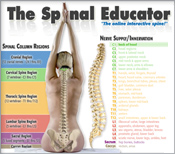| Sports and the Chiropractic Lifestyle Health begins before birth. Spinal injuries can restrict range of motion, reduce strength, slow reflexes, shorten endurance, and decrease performance. Chiropractic care for these types of injuries has become increasingly popular. Professional sports teams, Olympic trainers, and competitive athletes are employing chiropractic doctors —because they demand results. The lumbar spine is the most frequently injured area of the spine. Sports injuries among youngsters are often ignored as “growing pains”. Regular chiropractic checkups can help avoid problems seen later in adults. Help prevent sports injuries by proper stretching, warm-up and cool-down exercises, and by staying fit. Chiropractic care helps restore function to spinal joints that are fixated and not moving properly. Besides helping to relieve pain, chiropractic care can also help reduce inflammation. Muscles, tendons and ligaments depend upon proper joint movement for peak performance. Injuries to these tissues can reduce range of motion, decrease blood supply, and literally “take you out of the game.” Normalizing spinal function helps speed the healing of these soft tissues and reduces the deconditioning effect of being on the sidelines. An aerobic exercise program or a plan of brisk walking can improve muscle tone and help you recover from strains, sprains, and other activity-restricting health problems. Whether you golf, play tennis, bicycle, or bowl, the best treatment for sports injuries is prevention! Ask your Doctor of Chiropractic for a care plan based on your age, condition, and health objectives. Find out if chiropractic care can help restore your health, improve your performance, and increase your competitive edge. Consulting a chiropractic doctor. Problems can start with the spine and affect the extremities, or they can begin with an extremity, like a knee or an ankle and then create further compensation problems in the spine. Either way, many sports-related injuries involve the spine. Professional athletes, “weekend warriors” and those who just want to remain fit, are discovering the benefits of regular chiropractic care. Proper spinal function is essential for peak performance at work or play. THE CHIROPRACTIC LIFESTYLE Chiropractors are experts in the care of the bones, nerves, muscles and connective tissues that make up about 60% of your body. All of the joints in your body are part of this musculo-skeletal system and its optimal function is necessary for overall good health. Ask your Doctor of Chiropractic for more information about a care program that may include specific spinal adjustments, exercise recommendations, nutritional advice or other conservative methods of care based on your health history, age, current condition and lifestyle. REFERENCES:
Aspegren, D., D.C., Treating the Athlete’s Back: The Ultimate Challenge, Chiropractic Sports Magazine, 6(2): 49-56, 1992. Burn, L., A Manual of Medical Manipulation, Kluwer Academic Publishers, 1994. Ezzell-Nelson, M., The 16 Million Dollar Man; John Smoltz, Atlanta Braves, Today’s Chiropractic, pp. 61-65, May-June, 1993. Faye, L., D.C., Good Bye Back Pain, Tale Weaver Publishing, 1990. Hill, H., The Logical Approach to Diagnosis of Back Pain, Canadian Family Physician, 21: 79-83, 1975. Hochschuler, S., M.D., Texas Back Institute, Back in Shape, Houghton Mifflin Company, 1991. Kellett, J., Acute Soft Tissue Injuries: A Review of the Literature, Medicine and Science of Sports and Exercise, Vol. 18, No. 5, p. 489-500, American College of Sports Medicine, 1986. Lauro, J., D.C., Mouch, A., D.C., Athletic Performance Improvement, Journal of Chiropractic Research, January, 1991. Medical Bulletin, Globe International Group, Box 21, Rouses Point, New York, 12979, April, 1981. Roy, S., M.D., Irwin, R., M.D., Sports Medicine: Prevent, Evaluate, Management and Rehabilitation, Prentice-Hall, Inc., 1983. Schafer, R., D.C., Chiropractic Management of Sports and Recreational Injuries, Williams and Wilkins, 1986. ©2002 Back Talk Systems, Inc. (800) 937-3113 (303) 277-9990 www.backtalksystems.com |
1750 West Broadway Street, Suite 108 | Oviedo, Florida 32765
Tel: (407) 977-7233 | Fax: (407) 359-6822
Office Hours - call for appointment times
Oviedo Florida Chiropractor Chiropractors Chiropractic Doctors
Copyright 2024 - ChiroPlanet.com
Privacy Notice - Admin

